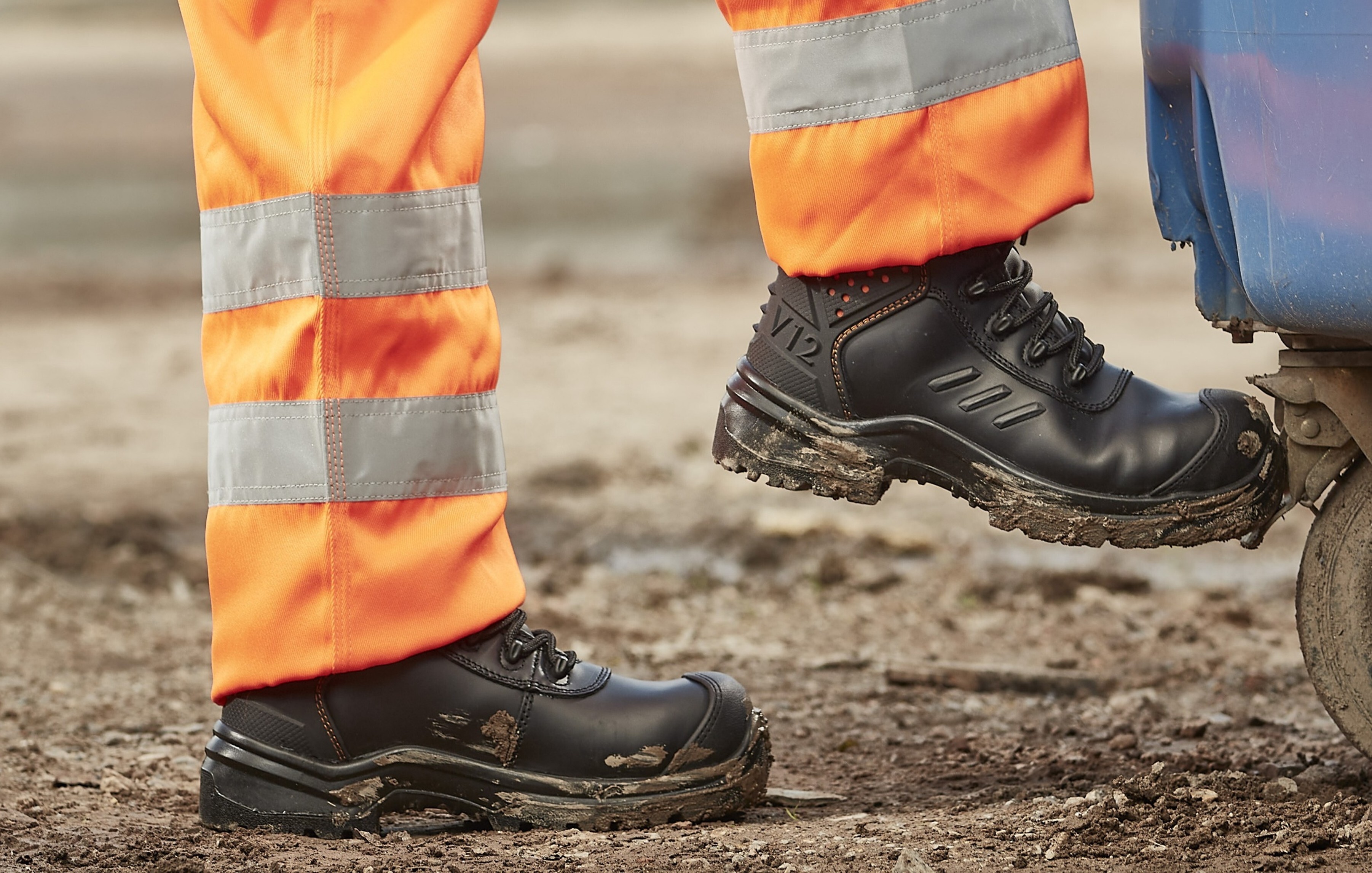Mechanics and Autoworkers spend hours on their feet in challenging conditions - on oily floors, with heavy tools, in high heat - all while having to adopt awkward postures in tight spaces. That’s why choosing safety boots and trainers engineered for the realities of workshop life which combine comfort, protection and performance is critical.
1. Durable Construction That Lasts
Look for triple-stitched leather or reinforced synthetic uppers for added strength. V12 Footwear’s Automotive range includes this upper strength as standard, as well as two other durability features that are a must for Mechanics - abrasion-resistant scuff caps and hard-wearing outsoles. Built to perform day after day, V12 are so confident in the toughness of their footwear, all their boots come with a 200-day guarantee as standard.
Also, look out for styles with leather uppers made with premium full grain leather, because this tough but supple water-resistant material gives wearers what they need to match the demands of their environment long-term.
2. Slip Resistance on SLIPPERY Floors
Did you know? According to the HSE, less than 1% of occupational accidents involve injuries to the toes, whereas more than 30% of non-fatal occupational accidents are slip related.
The HSE also tells us that slips, trips and falls are, on average, responsible for a third of all non-fatal injuries to employees reported by employers in Britain, and 95% of major slips result in broken bones.
But the types of flooring that Mechanics work on can be particularly hazardous, so an anti-slip tread is a crucial safety footwear element. Deep tread and high-traction rubber will prevent or reduce slips in oil, grease and water, keeping the wearer secure and stable at every step.
A good example of this is the IGSTM sole unit. Its hexagonal grip pattern and water-dispersing micro channels cut through water and direct it away, ensuring wearers are always in contact with the ground and avoid slipping, even in the most slippery conditions. Find out more about the IGSTM here.
Pictured: The Torque from V12 - it's IGS sole makes it a perfect safety style for working on potentially slippery and smooth surfaces.
3. Lightweight Protection
Composite toecaps are increasingly preferred over steel, as they offer equal protection with less weight, provide great flexibility, plus they protect the entire foot area from edge to edge.
While toecaps are a fundamental feature of any safety boot, a puncture-resistant midsole is also a must in any boot used around 'sharps' such as screws, nails or other underfoot objects that could pierce non-safety material - and a composite rather than steel midsole (or 'insert') will carry the same lightweight and flexibility benefits.
Moreover, because these components are non-metallic, they're ideal for working around engineering environments which feature electrical components or equipment.

4. Comfort for Long Shifts
Mechanics are moving - constantly. They stand, they kneel, they bend down, they stretch up. And what does that create? Perspiration. And sweaty feet equals two things - wet skin (which becomes soft skin vulnerable to chaffing) and hot feet. And both are super uncomfortable. So, choose footwear with breathable uppers and moisture-wicking linings to keep feet cool and dry, even during long or hot shifts.
It's also easy for Mechanics and Auto Engineers to develop musculoskeletal disorders from standing on hard surfaces and heavy lifting. But, these can be lessened with supportive and shock-absorbing insoles. They can ease pressure and foot pain, and when the specific arch height of the wearer’s foot (low, medium or high) is addressed with bespoke arch-height supporting insoles, comfort is fully maximised.
Pictured: V12 Footwear's Dynamic Arch insoles, specifically designed to support low, medium or high arched feet, preventing or reducing Plantar Fasciitis and supporting joint alignment.
5. Oil and Chemical Resistance
Exposure to oils and fluids can damage standard shoes, so Mechanics and Autoworkers should look for oil-and chemical-resistant soles to preserve the integrity and performance of their footwear.
Work boots with chemical-splash proof uppers - tested using sodium hydroxide and sulphuric acid - are an added defence against corrosive chemicals that could damage footwear. But it's not just to protect the footwear's integrity: the footwear protects the wearer, so if you or your team work around chemicals, chemical splashproof uppers could be vital in stopping skin burns, blistering, tissue damage or dermatitis.
Have you seen the Hyrax safety hiker from V12? It's chemical splashproof, metal-free and made with anti-shock and moisture-wicking materials - plus boasts the IGS sole unit - so it's a safety boot quite simply made for Auto Engineers and Mechanics.
CONCLUSION
For mechanics, safety footwear is an essential piece of PPE. By prioritising comfort, durability, slip resistance and protection, you’ll be investing in both safety and productivity.
Ready to explore V12’s Automotive safety footwear range? Click below. 👇








